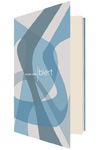Language means things, but no language is only its meanings: any word, said aloud, has a sound, and every phrase is also, in physicists’ terms, a set of waves moving through air, produced by tongue, pharynx, larynx, lungs, etc., as they act on the mix of gases we inhale or exhale. Since (at least) the heyday of Gertrude Stein, some poets have tried to focus on speech as physical event, on how brains make tongues create not meanings but sounds. These poets do not just complicate, but nearly sever, links between sound (“t” + “r” + “ee”) and meaning (what happens when you think of a tree). Such poetry gets repetitive fast unless the poet solves a knotty problem: how to give meaning and feeling (beyond the one-time-only flash of experiment) to language that comes across less as words than as sound?
Jordan Scott has found a smart, and a touching, solution. His poems of nonsense and near nonsense, of muddled or tangled articulations, have a subject for which his methods seem perfect: they review his experience as a stutterer, the emotional hurdles and intellectual paradoxes of being a speaker whom language may not obey. Marc Shell (whom Scott thanks) and other writers have depicted that experience in prose; Scott seems to be the first poet to make, from it, poems.
Scott dubs his work “a full bore squirm inside the mouth’s wear and tear”; “my symptoms,” he adds, “are the agents of composition.” The results can be nonsense (“Minnow fandango ossify estuary, woo uh-oh in Wang Chung haze”) but the book merits attention because, mostly, it is not nonsense at all: rather, it is a brilliant near nonsense, non-nonsense, bringing (as much as words can) to non-stuttering readers the misfires of one’s own short-circuited speech. Scott’s sentences, paragraphs, and versets (plus the occasional concrete poem) perch on the ridge between word and mere phoneme, instructing, e.g., “Muffle newfangled vow,” or complaining: “If therapy is a must, wad cakehole Blister Rust.”
Fake interviews ask italicized pseudo questions (“What is the utterance?”) to which this paradoxically articulate-yet-inarticulate poem can give no obvious answer. Nearly blank pages suggest awkward silences: a few read only “chomp set” (i.e., teeth) at the top, plus one or two words—“glacial jiggy,” e.g.— underneath. Other pages veer past bizarre onomatopoeias to limn the space between speech and non-linguistic sound—“How the kitchen muzzles clang-clang enamel for floured prose beaten and rolled into sense, and how the steam of hot taps saunas the knotted tendons of difficult phrases.” Extended metaphors concern bones and geologies, asking what hard structures lie under everyday surfaces, exposed when those surfaces break. Beyond the individual pages of hints and feints and muffled vows, the whole book works because, after all, it means something: it shows how...
You have reached your article limit
Sign up for a digital subscription and continue reading all new issues, plus our entire archives, for just $1.50/month.
Already a subscriber? Sign in





